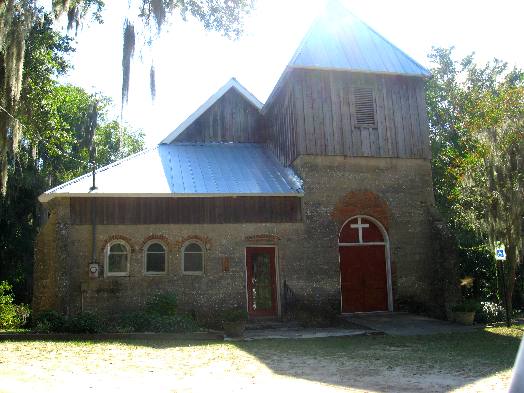Darien, GeorgiaRiver delta at Darien, Georgia
Darien, Georgia is located in the heart of the historic Altamaha delta region. Settled in 1736 by Scottish Highlanders under John McIntosh Mohr, it was named for the ill-fated settlement on the Isthmus of Panama. The first military parade in Georgia was held in Darien on February 22, 1736, when Gen. James Edward Oglethorpe reviewed the Highland Company in full refalla, with claymores, side arms and targes. The Highland Company supported Oglethorpe in all his campaigns, and won everlasting fame on the field of Bloody Marsh. During the Revolution, Darien men again came to the front. Gen. Lachlan McIntosh, Col. Wm. McIntosh and Col. John McIntosh were among the heroes of that War. In 1818 the City of Darien was chartered and became the County Seat. The Bank of Darien. Chartered in 1818 was the strongest Bank south of Philadelphia, with branches in 7 Georgia cities. Huge mills sawed into lumber millions of feet of timber that was rafted down the river. Darien was one of the great ports of the Eastern Seaboard. It was burned in 1863 by Northern troops stationed on St. Simons Island. Rebuilt in the 1870's Darien again became a great port, and the mills sawed lumber to be shipped all over the world. Depletion of the forests brought this era to an end in the early 1900's.
Darien's Fort King GeorgeFort DarienFort Darien was laid out by General James Edward Oglethorpe in 1736. It was constructed on the first high bluff to protect the new town of Darien. It was a large fortification, with two bastions and 2 half bastions and was defended by several cannon. From the time of its settlement by Scottish Highlanders in 1736 until after the Battle of Bloody Marsh in 1742, the town of Darien was in constant danger from the Spaniards of Florida. Often for weeks at a time the Highland soldiers were absent from home on military campaigns, with only a few men left to guard the women and children who, for safety, lived within the walls of the fort. On several occasions the post was fired upon by Spaniards or their Indian allies. After the War with Spain was ended, the fort, no longer needed, fell into ruins, but was rebuilt and armed during the Revolution, when it again saw action, this time against British forces.
Port of Darien
Situated ten miles from the Atlantic near the mouth of the Altamaha River, Darien attained prominence as a seaport in the 1820's. Rice and upland cotton from Georgia's interior were shipped from this waterfront. From 1870 to 1900, Darien served as the leading international timber center on the east coast through the milling and shipment of yellow pine and cypress rafted down the Altamaha River. With the decline of the timber trade, Darien turned to the commercial harvest of seafood and was homeport to one of Georgia's largest shrimp boat fleets by the 1940's. Saint Cyprian's Episcopal Church
Saint Cyprian's Episcopal Church in Darien was built "for the Colored People of McIntosh County," through the efforts of the Rev. James Wentworth Leigh, D. D., F. S. A., Dean of Herford, England. It was named for the martyred African Bishop. Contributions toward the building of the church edifice were received from England, Philadelphia and from local citizens. Members of the congregation, led by the Senior Warden, Lewis Jackson, gave devotedly of their time and labor. Saint Cyprian's church edifice was consecrated Sunday April 30, 1876, by the Rt. Rev. John W. Beckwith, Bishop of Georgia, and placed under the guardianship of Saint Andrew's Episcopal Church in Darien, of which the Rev. Robert Clute was then Rector. Saint Cyprian's Episcopal Church
An 1876 black Episcopal Church in Darien, Georgia.
Click here for some Georgia travellogsUntil next time remember how good life is. More Georgia AdventuresAdventures by State ** More 2010 Travel Adventures
Mike & Joyce Hendrix
Mike & Joyce Hendrix who we are We hope you liked this page. If you do you might be interested in some of our other Travel Adventures: Mike & Joyce Hendrix's home page Travel Adventures by Year ** Travel Adventures by State ** Plants ** Marine-Boats ** Geology ** Exciting Drives ** Cute Signs ** RV Subjects ** Miscellaneous Subjects
We would love to hear from you......just put "info" in the place of "FAKE" in this address: FAKE@travellogs.us Until next time remember how good life is.
|
| ||
|
| |||
|
| |||
|
|

